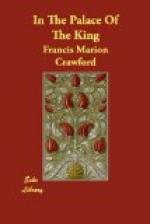Little more than ten years had passed since the boy had come, and he had neither died a natural death nor fallen in battle, and was grown up to young manhood, and was by far the greatest man in Spain. He had been treated as an inferior, the people had set him up as a god. He had been sent out to command expeditions that be might fail and be disgraced; but he had shown deeper wisdom than his elders, and had come back covered with honour; and now he had been commanded to fight out the final battle of Spain with the Moriscoes, in the hope that he might die in the fight, since he could not be dishonoured, and instead he had returned in triumph, having utterly subdued the fiercest warriors in Europe, to reap the ripe harvest of his military glory at an age when other men were in the leading-strings of war’s school, and to be acclaimed a hero as well as a favourite by a court that could hardly raise a voice to cheer for its own King. Ten years had done all that. Ten more, or even five, might do the rest. The boy could not be without ambition, and there could be no ambition for him of which the object should be less than a throne. And yet no word had been breathed against him,—his young reputation was charmed, as his life was. In vain Philip had bidden Antonio Perez and the Princess of Eboli use all their wits and skill to prove that he was plotting to seize the crown. They answered that he loved a girl of the court, Mendoza’s daughter, and that besides war, for war’s sake, he cared for nothing in the world but Dolores and his adopted mother.
They spoke the truth, for they had reason to know it, having used every means in their power to find out whether he could be induced to quarrel with Philip and enter upon a civil war, which could have had but one issue, since all Spain would have risen to proclaim him king. He had been tempted by questions, and led into discussions in which it seemed certain that he must give them some hope. But they and their agents lost heart before the insuperable obstacle




